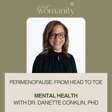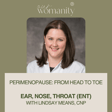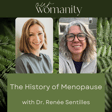
4. Perimenopause: Is Hormone Replacement Therapy (HRT) (MHT) for you? with Dr. Jewel M. Kling
In this episode, we welcome Dr. Jewel Kling, an expert in women's health and menopause. Dr. Kling is a professor of medicine, chair of the Division of Women's Health at the Mayo Clinic in Scottsdale, Arizona. She is also the director of the Women's Health Center and dean of the Mayo Clinic Arizona Campus. With a background in public health and internal medicine, Dr. Kling has become a recognized leader in the fields of menopause, sexual health, and LGBT care education. She speaks nationally on menopause and hormone therapy and has published extensively on the subject.
Dr. Kling joins us to dive into the topic of perimenopause, shedding light on common misconceptions and discussing the best approaches to treatment. In particular, she offers her insights on the pros and cons of starting hormone therapy during perimenopause and how to address contraception during this transitional period.
Key discussion points:
- Perimenopause and Hormone Therapy
- Managing Symptoms
- Contraception Considerations
- Individualized Care
Throughout the episode, Dr. Kling provides evidence-based insights and reassures women that effective treatments are available, especially for those suffering from persistent symptoms beyond the typical transition period.
As an advocate for women's health, Dr. Kling is also involved in advanced hormone therapy training through the International Society for the Study of Women's Sexual Health (ISWHISH), where she and Dr. Sarah Cigna offer a comprehensive course for healthcare professionals. See below!
Resources Mentioned:
- Advanced Hormone Therapy Course - A year-long virtual course for healthcare professionals, covering a range of topics, including hormone therapy and its effects on sexual functioning throughout different life stages, including pregnancy, lactation, and menopause.
- The Menopause Society - A resource for menopausal health and guidance on finding certified menopause practitioners.
If you're experiencing perimenopausal symptoms or seeking guidance on hormone therapy, this episode offers invaluable knowledge and practical advice for navigating this stage of life with confidence.
For more information on the Advanced Hormone Therapy Course and other resources, visit ISWHISH.



















